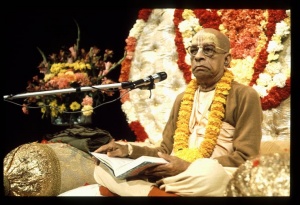CC Adi 6.104 (1975): Difference between revisions
(Vanibot #0027: CCMirror - Mirror CC's 1996 edition to form a basis for 1975) |
(Vanibot #0020: VersionCompareLinker - added a link to the Version Compare feature) |
||
| Line 2: | Line 2: | ||
<div style="float:left">'''[[Sri Caitanya-caritamrta (1975)|Śrī Caitanya-caritāmṛta (1975)]] - [[CC Adi (1975)|Ādi-līlā]] - [[CC Adi 6 (1975)|Chapter 6: The Glories of Śrī Advaita Acārya]]'''</div> | <div style="float:left">'''[[Sri Caitanya-caritamrta (1975)|Śrī Caitanya-caritāmṛta (1975)]] - [[CC Adi (1975)|Ādi-līlā]] - [[CC Adi 6 (1975)|Chapter 6: The Glories of Śrī Advaita Acārya]]'''</div> | ||
<div style="float:right">[[File:Go-previous.png|link=CC Adi 6.103 (1975)|Ādi-līlā 6.103]] '''[[CC Adi 6.103 (1975)|Ādi-līlā 6.103]] - [[CC Adi 6.105-106 (1975)|Ādi-līlā 6.105-106]]''' [[File:Go-next.png|link=CC Adi 6.105-106 (1975)|Ādi-līlā 6.105-106]]</div> | <div style="float:right">[[File:Go-previous.png|link=CC Adi 6.103 (1975)|Ādi-līlā 6.103]] '''[[CC Adi 6.103 (1975)|Ādi-līlā 6.103]] - [[CC Adi 6.105-106 (1975)|Ādi-līlā 6.105-106]]''' [[File:Go-next.png|link=CC Adi 6.105-106 (1975)|Ādi-līlā 6.105-106]]</div> | ||
{{CompareVersions|CC|Adi 6.104|CC 1975|CC 1996}} | |||
{{RandomImage}} | {{RandomImage}} | ||
==== TEXT 104 ==== | ==== TEXT 104 ==== | ||
<div class="verse"> | <div class="verse"> | ||
:śāstrera siddhānta ei, | :śāstrera siddhānta ei,--vijñera anubhava | ||
:mūḍha-loka nāhi jāne bhāvera vaibhava | :mūḍha-loka nāhi jāne bhāvera vaibhava | ||
</div> | </div> | ||
| Line 32: | Line 31: | ||
<div class="purport"> | <div class="purport"> | ||
When a person is liberated in the sārūpya form of liberation, having a spiritual form exactly like Viṣṇu, it is not possible for him to relish the relationship of | When a person is liberated in the sārūpya form of liberation, having a spiritual form exactly like Viṣṇu, it is not possible for him to relish the relationship of Kṛṣṇa's personal associates in their mellow exchanges. The devotees of Kṛṣṇa, however, in their loving relationships with Kṛṣṇa, sometimes forget their own identities; sometimes they think themselves one with Kṛṣṇa and yet relish still greater transcendental mellow in that way. People in general, because of their foolishness only, try to become masters of everything, forgetting the transcendental mellow of servitorship to the Lord. When a person is actually advanced in spiritual understanding, however, he can accept the transcendental servitorship of the Lord without hesitation. | ||
</div> | </div> | ||
Latest revision as of 18:52, 26 January 2020

A.C. Bhaktivedanta Swami Prabhupada
TEXT 104
- śāstrera siddhānta ei,--vijñera anubhava
- mūḍha-loka nāhi jāne bhāvera vaibhava
SYNONYMS
śāstrera—of the revealed scriptures; siddhānta—conclusion; ei—this; vijñera anubhava—realization by experienced devotees; mūḍha-loka—fools and rascals; nāhi jāne—do not know; bhāvera vaibhava—devotional opulences.
TRANSLATION
This conclusion of the revealed scriptures is also the realization of experienced devotees. Fools and rascals, however, cannot understand the opulences of devotional emotions.
PURPORT
When a person is liberated in the sārūpya form of liberation, having a spiritual form exactly like Viṣṇu, it is not possible for him to relish the relationship of Kṛṣṇa's personal associates in their mellow exchanges. The devotees of Kṛṣṇa, however, in their loving relationships with Kṛṣṇa, sometimes forget their own identities; sometimes they think themselves one with Kṛṣṇa and yet relish still greater transcendental mellow in that way. People in general, because of their foolishness only, try to become masters of everything, forgetting the transcendental mellow of servitorship to the Lord. When a person is actually advanced in spiritual understanding, however, he can accept the transcendental servitorship of the Lord without hesitation.